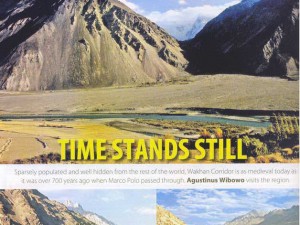Jakarta Post Weekender (2008): Time Stands Still
http://www.thejakartapost.com/weekender/0801beyond.asp BEYOND BORDERS: Time Stands Still Sparsely populated and well hidden from the rest of the world, Wakhan Corridor is as medieval today as it was over 700 years ago when Marco Polo passed through. Agustinus Wibowo visits the region. The awkward tongue of Afghanistan, located at the northeastern tip of the country, is a 200-mile-long valley that stretches between Tajikistan and Pakistan. A strategic territory created by the once-reigning British Empire at the end of the 19th century, Wakhan Corridor was first attached to Afghan territory as a buffer zone between Britain and Russia. Though the battle for supremacy between the two giants has long ended, little seems to have changed since then. Time has been suspended for what seems like eternity. Deprived of the comforts of modern living, Afghans tend to paint rosy images of Tajikistan, where women are not required to wear the burqa and children receive the education they deserve. [read more]

